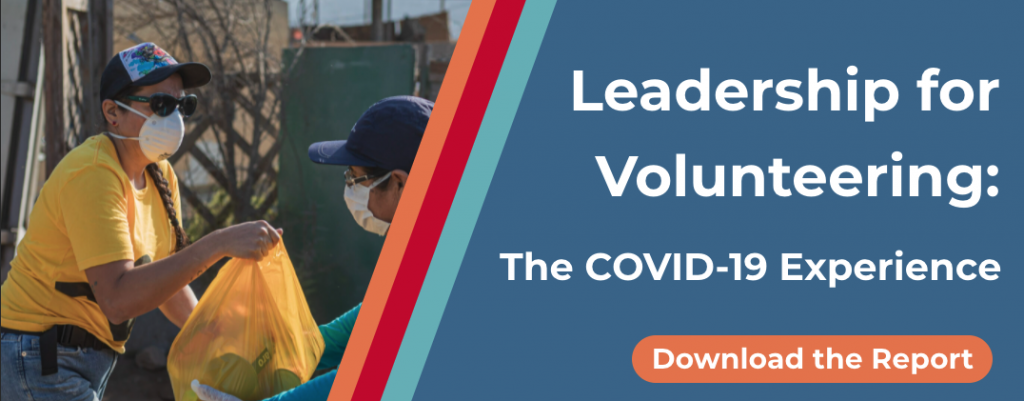News
Stay updated with the latest from Volunteering New Zealand

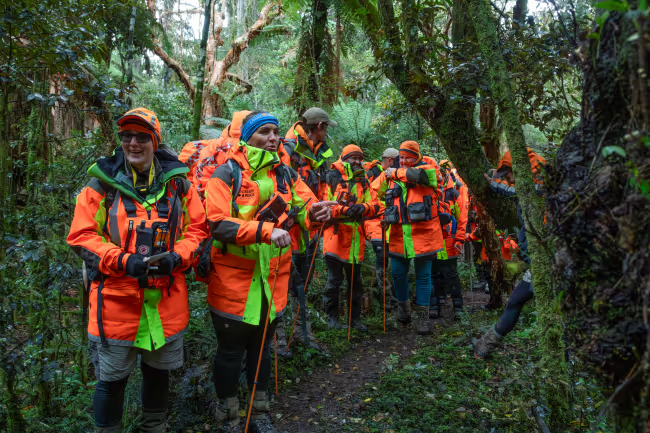
The volunteers of Land Search and Rescue are a diverse whānau of people who step forward when others are lost. From the wind-swept peaks to dense bush valleys, underground caves to urban edge, our volunteers come together with one shared mission: to bring people home.

Our journey into volunteering begins not with a single story, but with hundreds — ordinary New Zealanders who, at some point, felt the tug of service. For some, it was a lost tramper they once heard about. For others, it was the call of the hills, or the memory of someone who never made it home.
They came from farms and offices, classrooms, and workshops, joined training nights after long days, gave up weekends, missed birthdays, and stood ready — not for reward, but because they cared. One moment that still lifts our hearts: a young boy, separated from his whānau on a bush walk, was found after a long search — cold, frightened, but alive. As the volunteer wrapped him in a thermal blanket and radioed in the good news, the sense of relief and joy echoed through the entire operation. Some volunteers cried. Others just looked up at the sky and quietly said, "Ka pai, e hoa." In that moment, whether you were at the base managing logistics, flying gear in, handling comms, or pacing in the bush with your search dog — you knew you made a difference.
But not every search ends that way. We remember those we couldn’t save — not as failures, but as reminders of why we train harder, prepare better, and support each other more deeply. In returning someone to their loved ones, even in sorrow, we honour the sacredness of life. And in those hard times, the strength of our team — the manaaki, the quiet hugs, the shared karakia — weaves us even closer together.

Volunteering for Land Search and Rescue is not just a task; it’s an aroha-fuelled calling. Our roles are varied: search and rescue reponders, WanderSearch coordinators, Alpine Cliff Rescue, CaveSAR, RiverSAR, CanyonSAR, Search Dog specialists, logistics, admin, planning, committee governance — every hand plays a part. Many of our volunteers never step into the field, yet they are the backbone. A rescue cannot begin without equipment packed, maps printed, radios checked, and food prepared. Every step counts —and every person behind each step matters.
The impact of this mahi reaches far beyond the bush line. Volunteers find purpose, whānau, and personal growth. They gain confidence, resilience, empathy. They build friendships that last lifetimes. One volunteer said, “I came for the mountains — I stayed for the people.” Another, “Rapa Taiwhenua gave me more than I ever gave it.”
Through Land Search and Rescue, we’ve seen the very best of humanity. People of all cultures, backgrounds, and beliefs, united not by uniform but by shared purpose. Whiria te tangata — we truly live this. We are woven together by experience, by sweat and mud, by laughter in the truck and silence under starlit skies. And every time we come together — whether to save a life or remember one — we weave ourselves tighter still.
To be recognised would be a deep honour. But even more than that, we hope this story carries the spirit of all Land Search and Rescue volunteers — the unseen, the unwavering, the ones who walk quietly and carry others through the storm.
Every step matters. Every person counts. This is who we are.

Campaigns - National Volunteer Week
Community
Mahi Aroha
Māori Wardens show mahi aroha in many places and spaces
Māori Wardens are an incredible group of volunteers who show mahi aroha in many places and spaces around Aotearoa. Here are some of their stories from the past year.

WAITANGI- NATIONAL CELEBRATIONS
Maryann Vogt leads Māori Warden operations at Waitangi’s Whare Rūnanga each year. A Warden since 1984, Maryann has been a constant presence at Waitangi Day events, where Wardens uphold safety amidst gatherings of Ministers, government officials, protesters, and the public.
Maryann runs a team of thirty-five Māori Wardens in shifts. (Another 60 wardens manage crowds and cars at other popular Waitangi events.
Every Māori Warden you see on the frontline is a volunteer. They work long shifts, sleep in campground bunks, and rise at 3 a.m. to ensure they’re on-site early—navigating infamous Waitangi traffic.
Maryann’s familiar presence is both reassuring and respected and her steadfast commitment to the safety of all attendees embodies the spirit of service that defines Māori Wardens. Maryann and her team work seamlessly with other regional Wardens and NZ Police to provide a calm, grounded presence, all as volunteers.
WAIROA FLOODING AND AFTERMATH
In June 2024, Wairoa was devastated by severe flooding that displaced hundreds and left many more in hardship and distress. The community was still recovering from the impact of Cyclone Gabrielle the previous year.
In response, 24 dedicated Māori Wardens mobilised and were on the ground immediately, delivering household support, welfare transport, and conducting 24/7 security patrols for over a month—providing reassurance and preventing looting. Their continued daytime patrols extended for another fortnight, ensuring ongoing safety and calm.
Welcomed with open arms, Māori Wardens reached out to whānau who might otherwise not seek help. They collaborated closely with marae, hapū, and iwi, reinforcing the importance of Māori-led resilience efforts in times of crisis.
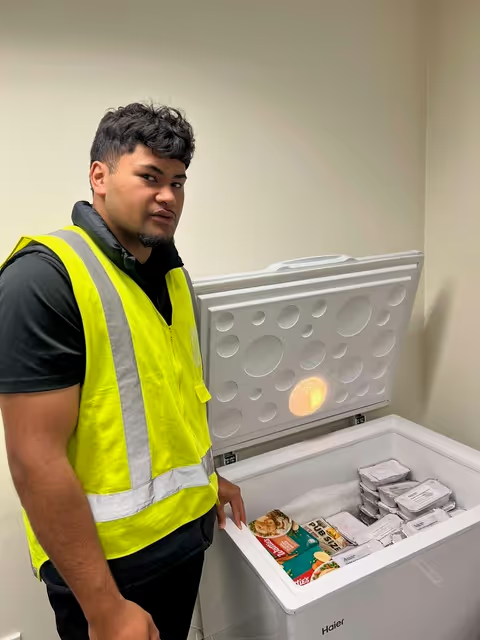
AUCKLAND CITY
Helping the homeless and distributing rescued food
In the heart of Auckland city, Māori Wardens run a daily outreach centre for the homeless—open every day from 9am to 4pm.
They offer hot meals, clean showers, laundry, secure storage, and advocacy support—welcoming 45–70 individuals daily, 364 days a year.
In addition to providing a service to the homeless, Māori Wardens operate a significant food redistribution initiative.
Twice weekly, they collect five pallets of surplus food from Auckland City Mission provided by the charity Kiwiharvest. All five pallets are redistributed within 24 hours to feed 250–300 individuals.
Blaine Hoete says: KuraKai is an initiative that we support heavily. We collect cooked frozen meals (by Corporate Companies) and store till I have at least 500 meals (bi-monthly) and the drop off to secondary schools for Rangatahi to heat and eat or take home and feed whaanau.
This voluntary effort is led by the regional entity Ngā Purapura Wātene Mauri o Te Rōpū Kotahi.

Campaigns - National Volunteer Week
VNZ Events
News
National Volunteer Week celebrates millions of volunteers
Media release: National Volunteer Week, which runs from 15–21 June, is the biggest celebration of volunteering in New Zealand. Volunteering New Zealand | Tūao Aotearoa leads this national event. This year’s theme is Whiria te tangata – Weaving the people together.
National Volunteer Week, which runs from 15–21 June, is the biggest celebration of volunteering in New Zealand.
Volunteering New Zealand | Tūao Aotearoa leads this national event. This year’s theme is Whiria te tangata – Weaving the people together.
“National Volunteer Week is an opportunity to thank the millions of volunteers who make a difference to our communities every day. We know of 50 events being held by volunteer centres and community organisations celebrating over 3000 volunteers,” says Michelle Kitney, Chief Executive of Volunteering New Zealand.
Over 53% of adult New Zealanders volunteer, either for organisations or directly helping others. Formal volunteering is worth $6.4billion to the economy, and when you add in direct volunteering as well it’s worth over double that at $14.4 billion.
More than the economic value, volunteering is vital to the health and wellbeing of our communities. Volunteers are everywhere—supporting aged care, disability services, community programmes, the arts, sports, emergency response, and caring for our environment. Their work touches almost every part of our lives.
Volunteering also gives back to those who volunteer. It helps people feel connected, supported, and valued. Volunteering is a powerful movement and is a key contributor to community.
“This National Volunteer Week we celebrate the diversity of volunteers and volunteering, mahi aroha and social action in Aotearoa.
“Join us this National Volunteer Week as we celebrate our collective impact,” Michelle says.
Find out more at: https://www.volunteeringnz.org.nz/campaigns/national-volunteer-week
ENDS
Volunteering statistics
· Volunteering participation continues to increase: Over half of New Zealanders (53.0%) volunteered over the previous four weeks. This is an increase of 4.5% from the previous period (50.7% in 2021).
· Average hours volunteered have increased: The average hours people volunteered were 18.1 hours over the previous four weeks. This is an increase of 2.2 from 2021, when the average hours people volunteered were 15.9 hours over the previous four weeks.
· The financial value of volunteering is calculated from 231.2 million hours per year x the living wage ($27.80) = $6.43 billion. Including formal and direct volunteering 516.74 billion hours x the living wage ($27.80) = $14.37 billion.
· People aged those aged 45 to 64 are doing most of the volunteering: The age group with the highest rates of volunteering are those aged 45 to 64, with 59.3% of people in this age group volunteering either directly or through an organisation. 54.1% of people aged 65 and above volunteer.
· 5 hours or less every four weeks is most common time given: 32.5% of people volunteered for less than 5 hours over the previous 4 weeks – the most common amount of volunteering work done
Source: 2023 General Social Survey (26 March 2025 Wellbeing Statistics Update).

Campaigns
Community
Diversity
Volunteering provides sense of belonging in new country
Nishadi was searching for a way to belong when she moved from her home in Sri Lanka to New Zealand in 2023 to pursue her PhD studies at Victoria University of Wellington. Like many students arriving in a new environment, she was searching for some way to connect, contribute, and feel part of something. She found that in volunteering!

Nishadi was searching for a way to belong when she moved from her home in Sri Lanka to New Zealand in 2023 to pursue her PhD studies at Victoria University of Wellington.
Like many students arriving in a new environment, she was searching for some way to connect, contribute, and feel part of something. She found that in volunteering!
She joined the volunteering programme through the university and started small-scale, event-based volunteering.
“What started as curiosity gradually became something deeply meaningful. With time I felt more confident and began participating in broader community events, from working bee clean-ups to major Wellington events like Festival for the Future, Cuba Dupa, and the Diversity Festival. I also ended up as a regular volunteer at community-focused organisations like New Zealand Red Cross and student support programs like International Buddy Program.
“I now regularly volunteer in student support teams within the university, sustainability programs and cultural exchange events. Each encounter offers a fresh perspective and reminds me of the shared human need for connection and caring about each other. One of my upcoming plans is to use my baking skills to make a large-scale donation to an organisation supporting children in need—combining my personal passions with the desire to give back.
“As a PhD candidate researching about loneliness in migrant communities, I now realise how essential social connection is—not just in theory, but through lived experience. The connections I’ve formed while volunteering reflect the very outcomes I hope to achieve in my academic work. For the organisations I’ve supported, I hope my contributions have helped move their missions forward, even in small ways.
“This year’s National Volunteer Week theme, Whiria te tangata – weaving the people together, beautifully captures what volunteering has meant to me. I’ve built networks with people from different backgrounds, disciplines, cultures and stories. Each thread of connection—whether forged during a community clean-up or over shared cupcakes at a bake sale—has woven a richer, warmer fabric around my life. I now feel less like a visitor and more like someone who belongs.”

Campaigns
Community
Conservation
Friends of Central Park
The Upstream Friends of Central Park is a voluntary community group. It was established in 2005, and members carry out volunteer conservation work in the park and help the Wellington City Council manage the park.

The Upstream Friends of Central Park is a voluntarycommunity group. It was established in 2005, and members carry out volunteerconservation work in the park and help the Wellington City Council manage thepark.
Member Celia Murphy says, “Since its inception the group hasbeen working to restore the Moturua Stream environment to good health andenhance the park’s amenities to contribute to Central Park being a safe,accessible and attractive urban oasis for the people of Wellington.”
Central Park accessible and popular
Central Park is a large park and green area in Wellington, close to the centre of the city. It is popular a walking commuter route to the city from the Brooklyn and the southern suburbs and is very close to several city council social housing apartment complexes which house a number of low-income families and new to New Zealand refugee families. The park provides a very close recreational area for the people living in these apartment blocks.
The Friends of Central Park operate as a group with no appointed officers or any formal structure. There is a core of about 10 volunteers who regularly participate and take on responsibilities to support the functioning of the group.
Up to 20 people regularly come for the Sunday working bee sessions.
The Friend’s group has won several Community Champion Awards over the years for its conservation and volunteer work in the park.
Friendship and morning teas
Celia explains: “While conservation is the main purpose of the group for the regular volunteers, some who have been coming since the group began 20 years ago, the friendship and camaraderie is as important as the weeding and planting work. Newcomers are always made welcome with the experienced volunteers helping newbies to identify weeds from wanted plants and teach them how to do things. There is always a great deal of chat, and the morning teas are an important part of the experience.
“There is always home baking for morning tea. Donna’s cheeses cones, Angelique’s chocolate chip cookies and Jane’s cakes are all worthy of comment. At a recent working bee, the age of the volunteers ranged from 9 to over 70 and, as it often does, included a range of different nationalities.
“Most people find the satisfaction of seeing the park look better worth the effort and dirty hands. Our successes and the camaraderie keep people coming back again and again.
“Friends of Central Park is very good name for the group as it is not only the park that benefits – many people have become friends as they worked alongside each other and communed over coffee and cake.”

The Social Security Amendment Bill has passed into law and the new Community Work Experience requirements for some job seeker beneficiaries as a ‘non-financial sanction’ has come into effect from 26 May 2025. Community organisations may be approached by job seeker recipients needing to meet these obligations.
The Social Security Amendment Bill has passed into law and the new Community Work Experience requirements for some job seeker beneficiaries as a ‘non-financial sanction’ has come into effect from26 May 2025.
Community organisations may be approached by job seeker recipients needing to meet these obligations.
Job Seeker recipients subject to this obligation must:
- Secure a suitable community work experience placement within two weeks.
- Complete at least 5 hours of work experience each week for 4 weeks.
- Have their proposed activity and host organisation approved by MSD before they can begin.
MSD has now produced a factsheet on the proposed Community Work Experience. Our understanding is that no organisation is required to accept a client for Community Work Experience (CWE) and MSD will not recommend it to clients who are not willing to engage in CWE, they will instead be assigned either another non-financial sanction or financial sanction.
Volunteering New Zealand made a submission on the bill and provided feedback to the Select committee noting:
- Community Work Experience is not volunteering. It is not called volunteering in the Bill.
- It's likely to be time consuming or even unworkable for community organisations and volunteer centres who engage with MSD clients for community work experience.
However, volunteering is a great pathway into work or to navigate work transitions! Recent research uncovered that a third of volunteers have landed a job using their volunteer experience. Over half of these volunteers signalled that including volunteer experience on their resume was useful.
Tips if your organisation is open to supporting someone through the Community Work Experience Scheme:
- Have clear policies in place for short-term unpaid placements, including health and safety processes.
- Be ready to draft a basic placement agreement quickly, outlining tasks, hours, and support provided. [Note that MSD is providing a form that the client takes to the organisation].
- Decide in advance what roles or tasks might be appropriate for short-term, supervised work.
- Make a plan for supervision and feedback reporting to MSD.
- Consider your capacity — it’s okay to say no if you cannot support a placement safely and meaningfully.
Source: https://socialink.org.nz/blog/2025/05/15/supporting-someone-for-community-work-experience/

Campaigns
Community
Volunteers share love of radio
Coast Access Radio is one of 12 independent Access radio stations and covers the Kapiti and Horowhenua areas. Two volunteers at either end of the age spectrum volunteer with the station. Here are their stories.
Coast Access Radio is one of 12 independent Access radio stations and covers the Kapiti and Horowhenua areas.
Two volunteers at either end of the age spectrum volunteer with the station. Here are their stories.
.avif)
Kai Claughton-Smith
After I left school, I had a couple of retail jobs but mostly I was just hanging with friends and doing nothing. It was really boring and at 19, I didn't know what I wanted to do with my life. My Mum knew the station manager at Coast Access Radio and told her I could possibly be a volunteer.
I started producing and editing programmes in March this year. I really enjoy the stories older people talk about in the programme Write Your Story. Older people have a lot of knowledge to share with other generations. They have stories like nothing I've ever heard before.
I get a lot of satisfaction from doing something well, like editing a programme and I know that my skills are needed at the station. I love being able to meet people from all different ways of life. Our guests are all unique and all have a story to tell. That's what keeps me coming back.
Volunteering at Coast Access Radio is a stepping stone into a career in broadcasting or communications for me. I would like to work as a broadcaster on The Edge or another national radio station. Or perhaps as a TV presenter or an overseas correspondent.
My volunteering has freed up some time for Station Manager Catherine who enjoys showing me how to do something which I can then run with. She says my generation is the future of the radio station.

Paul Nees
Retirement brings options. Without work commitments, you can pursue interests, enjoy what matters to you, engage with (and contribute to) the local community. For me, that has translated to a volunteer gig with community station, Coast Access Radio. After starting in late November 2022 my involvement has developed and expanded. This has brought benefits, both personal and in community engagement.
Before retirement I had become a regular Coast Access listener, appreciating their range of programmes. I thought it would be fantastic to be involved in a volunteer role.
So, I emailed Coast Access, offering to volunteer and describing my music interest. The station manager invited me in for a chat. He offered a half-hour music programme for the remainder of 2022 with the option, if things worked out, of an hour a week from the beginning of 2023.Soundwave was born and I loved sharing my music passion with listeners.
So far I have researched, prepared recorded and broadcast135 programmes and since starting the show, listenership has increased. This is hugely gratifying and hopefully I’m playing a part to expand the listening experience for people, like radio did for me.
In early 2023, I got involved in live broadcasting, taking on the two-hour Friday Morning Show. After brief training I was on my own; scary at first and plenty of mistakes made! It’s satisfying to be able to connect directly with the community, share information about local events andinterview interesting people in the Kapiti and Horowhenua area.
Recent events have meant I felt the need to support the station further and ease the considerable load of the fantastic, employed staff. I’ve willingly stepped up, becoming another person who can help others record and edit their shows. I’ve also helped train some new volunteers who have come on board. My commitment to the station has expanded to two full days a week and sometimes a little more and I’m very happy about that.
I’m living my dream, smiling every day.

Campaigns
Latest News
Campaigns - National Volunteer Week
Recognition
How to get involved in The Big Shout Out 2025
This June let's give a #BigShoutOut to the volunteers in our community!
.avif)
Give a Big Shout Out to volunteers!
This June, we’re celebrating the volunteers who make a difference across Aotearoa New Zealand every day.
They are our companions, firefighters, sports team coaches, fierce advocates, environmental stewards, and so much more. They give their time, energy, and heart to help others — now it’s their time to shine.
How to get involved
- Get resources from the Big Shout Out campaign page
- Give a shout-out on social media - Use #TheBigShoutOut and tag @VolunteeringNZ
- Provide a shout of kai – morning tea, lunch, BBQ, whatever suits your team
- Create a short, heartfelt video saying “Thank you” to the volunteers who have contributed to your organisation, community, or even your own life.
Here are some prompts/ questions to answer in your video.
Filming tips
Keep it simple – here's how:
Device: Use your smartphone (iPhone or similar) with a good-quality camera.
Sound: Film somewhere quiet – indoors is best, away from busy spaces.
Background: Keep it simple and uncluttered.
Orientation:
Portrait (vertical) for Instagram/ stories
Landscape (horizontal) may work better for Facebook or YouTube
Introduce yourself: Say your name and your organisation (if relevant).
Keep it short: Aim for around 30 seconds
Need inspiration? Here are some handy prompts:
>> It’s the Big Shout Out and I’m giving a big shout-out to volunteers because...
>> Thanks to all the volunteers at [your org]! I’m really grateful for...
>> Ngā mihi nui volunteers! I appreciate your mahi because...
>> Volunteers are important because...
Share your video!
Post your video on your social media and tag @volunteeringnz
Send it to us via this form so we can share it too.
Let’s flood Aotearoa New Zealand with messages of gratitude, celebration, and the power of volunteering!

Campaigns - National Volunteer Week
VNZ Events
Celebrate volunteering during National Volunteer Week
National Volunteer Week, 15-21 June 2025, is Aotearoa’s largest annual celebration of volunteering.
National Volunteer Week, 15-21 June 2025, is Aotearoa’s largest annual celebration of volunteering.
It is an opportunity to support, recognise, and encourage volunteering within the community sector and beyond. This year’s theme – Whiria te tangata – weaving the people together – speaks to the way volunteering strengthens communities and builds connection.
Key Messages
- National Volunteer Week is our country’s largest celebration of volunteers and volunteering.
- 2025’s theme is Whiria te tangata – weaving the people together. Volunteering weaves us together, strengthening the fabric of our communities for a stronger, more inclusive Aotearoa.
- Over half of New Zealanders volunteer and they play vital roles – as coaches, caregivers, emergency responders, community builders, environmental champions, and more.
- Recognising volunteers fosters a culture of appreciation and inspires future generations to get involved.
- Let’s celebrate the diversity of volunteers and the strength of collective action and mahi aroha.
Actions you can take
>> Get resources from our National Volunteer Week campaigns page.
>> Use these tools to:
- Say thank you to volunteers
- Promote events or activities
- Share stories and social media posts
- Encourage others to get involved
>> Download our NVW2025 Comms Pack and start spreading the word
>> Be inspired by our 15 ways to celebrate National Volunteer Week one-pager
Contact us for more help.

Latest News
Volunteers
More New Zealanders are volunteering
Over half of New Zealanders (53.0%) volunteer – an increase of 2.3% since 2021 (50.7%) – and are volunteering an average of 18.1 hours over the previous four weeks (15.9 hours in 2021).
Over half of New Zealanders (53.0%) volunteer – an increase of 2.3% since 2021 (50.7%) – and are volunteering an average of 18.1 hours over the previous four weeks (15.9 hours in 2021).
Volunteering New Zealand has obtained these previously unreleased figures from StatsNZ. They are from the 2023 General Social Survey (26 March 2025 Wellbeing Statistics Update).
For those that volunteered, 27.6% volunteered through an organisation (30.2% in 2021), and 40.8% volunteered directly for another person (36% in 2021).

Volunteering over the previous four weeks
Volunteering New Zealand Chief Executive Michelle Kitney said, “The increase in volunteer participation is great news. However, the figures show that people are choosing to give their time more directly to other people. Organisations may continue to face challenges with volunteer availability.”
The most common amount of time volunteering was less than five hours over the previous four weeks (32.5%). Those who contributed over 25 hours was 20.3%.
“Our own State of Volunteering research found the same trend. The idea of the ‘civic core’ – a few people doing the most volunteer work – is changing, and there is a swing towards episodic, more casual volunteering,” Michelle said.

Percentage of volunteers by number of hours contributed
The new statistics include volunteering measures by age, gender, ethnicity, income and housing tenure.
The age group with the highest rates of volunteering (59.3%) are those aged 45 to 64, while 54.1% of people aged 65 and above volunteer. Volunteers are most likely to be: aged between 45 and 64, female, European or Māori, have a personal income of $70,001 or more, and own their own home.

For more information see: https://www.stats.govt.nz/information-releases/wellbeing-statistics-2023/

Awards
Campaigns
Conservation
Campaigns - National Volunteer Week
Volunteers
Harikoa – Stories of Joy
Let’s celebrate mahi aroha, volunteer work, that brings givers and receivers harikoa, joy.
Harikoa – Stories of Joy
Let’s celebrate mahi aroha, volunteer work, that brings givers and receivers harikoa, joy.
Tell us your volunteer story (individual or team) and share the joy!
VNZ is collecting diverse stories
Volunteering New Zealand is gathering stories of volunteering from across Aotearoa. We want to celebrate the diversity of volunteers and volunteering, mahi aroha and social action in Aotearoa.
The volunteers whose stories resonate the most with us will be invited to a special celebration of volunteering at Parliament during National Volunteer Week.
How to tell your story
We invite you to tell your volunteer story – in words, video or pictures.


You can tell us if you’re responding as an individual, or on behalf of an organisation or team.
Questions to consider for your story
These are optional – and are included as prompts in the orange form.
- How did you get started in volunteering? What has your volunteering journey been like?
- Describe a volunteer experience that lifted your heart or warmed your soul (what gave you satisfaction, happiness, energy)
- Describe a volunteer experience that gave you belief in, and hope for people or the planet (what makes you optimistic and makes you want to keep volunteering).
- What is the outcome/ impact of volunteering for you personally and for your organisation?
- The theme of National Volunteer Week is Whiria te tangata – weaving the people together. Have you made many new connections through your volunteer role?
We ask your permission to share
The forms include asking for your permission to share your story (or parts) across our channels – website, social media, newsletters.
How to film a video
- Use an iPhone or other device with a high-quality camera
- Film in a space where there is minimal background noise (inside is best, in a quiet area)
- Film your video against a clear and uncluttered background.
- Say your name and what organisation you are from or represent (if applicable).
- IMPORTANT: Please record your video in the right format. Portrait works best for Instagram, landscape for Facebook.
- Keep it short – 15-30 seconds is ideal for social media. No more than 90 seconds.
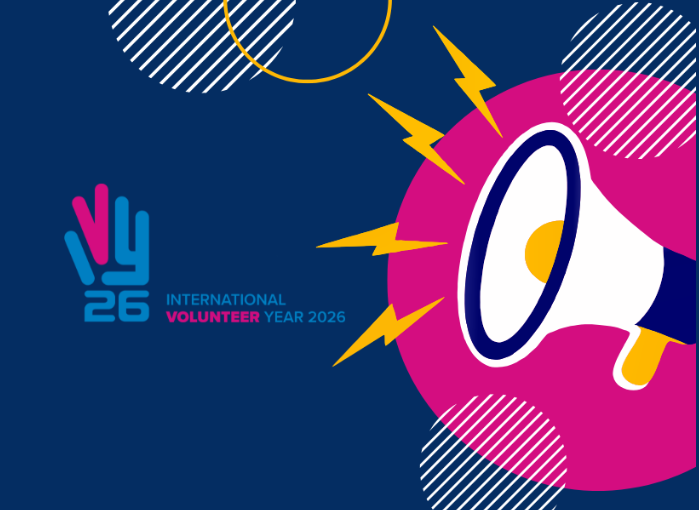
Recognition
Research
Sustainable Development Goals
Volunteers
A call to action for the future of volunteering
In December 2023, the UN General Assembly declared 2026 the International Year for Volunteers for Sustainable Development (IVY 2026).
In December 2023, the UN General Assembly declared 2026 the International Year for Volunteers for Sustainable Development (IVY 2026).
This is an opportunity to emphasise the power of volunteering, encourage greater investment in volunteering, and secure commitments from governments and others to support volunteering and an enabling environment in which volunteering will flourish.In preparation for IVY 2026 a group, led by the International Association for Volunteer Effort and Forum, IFRC, and UNICEF Generation Unlimited, was formed in early 2024 to drive global engagement in the co-creation of a call to action for volunteering.
Global challenges paper
This group has now collectively released a Global Challenges Paper.
It frames a global dialogue in anticipation of IVY 2026.
It aims to encourage conversations about volunteering that will inform and inspire action, leading to greater recognition and investment in the field.
It also highlights that Government, Corporate, Philanthropy and Civil Society all have a role to play in enabling the volunteering system.Key Trends and Implications for the New Zealand context:
- Adaptability and Innovation: The Covid-19 pandemic highlighted the ability of volunteer organisations, including grassroots efforts, to adapt and innovate rapidly.
- This is a crucial lesson for New Zealand, emphasising the need to support flexible volunteering models and rapid response capabilities within the volunteer sector.
- Digital Divide: The pandemic underscored the importance of digital communication and the benefits of good digital systems to manage volunteers.
- It also exposed the digital divide.
- How could technology support volunteers and organisations in the volunteering system, or remove barriers to participation in volunteering?
- Changing Volunteer Profiles: With shifts in volunteer demographics reflecting wider societal shifts how should we focus on engaging and supporting diverse age groups in volunteering, creating opportunities for youth leadership and intergenerational collaboration?
- Barriers to participation: Advocacy for inclusivity has grown, emphasising the participation of marginalised groups.
- New Zealand needs to continue addressing biases related to race, class, gender, and identity within its volunteer sector, ensuring equal opportunities for all.
- Valuing Volunteer Contributions: There's a growing recognition of the importance of all forms of volunteering, including informal and community-based efforts.
- What can be done to value and support diverse volunteering models, recognising local knowledge and contributions.
Find out more on the Call to Action for the Future of Volunteering.
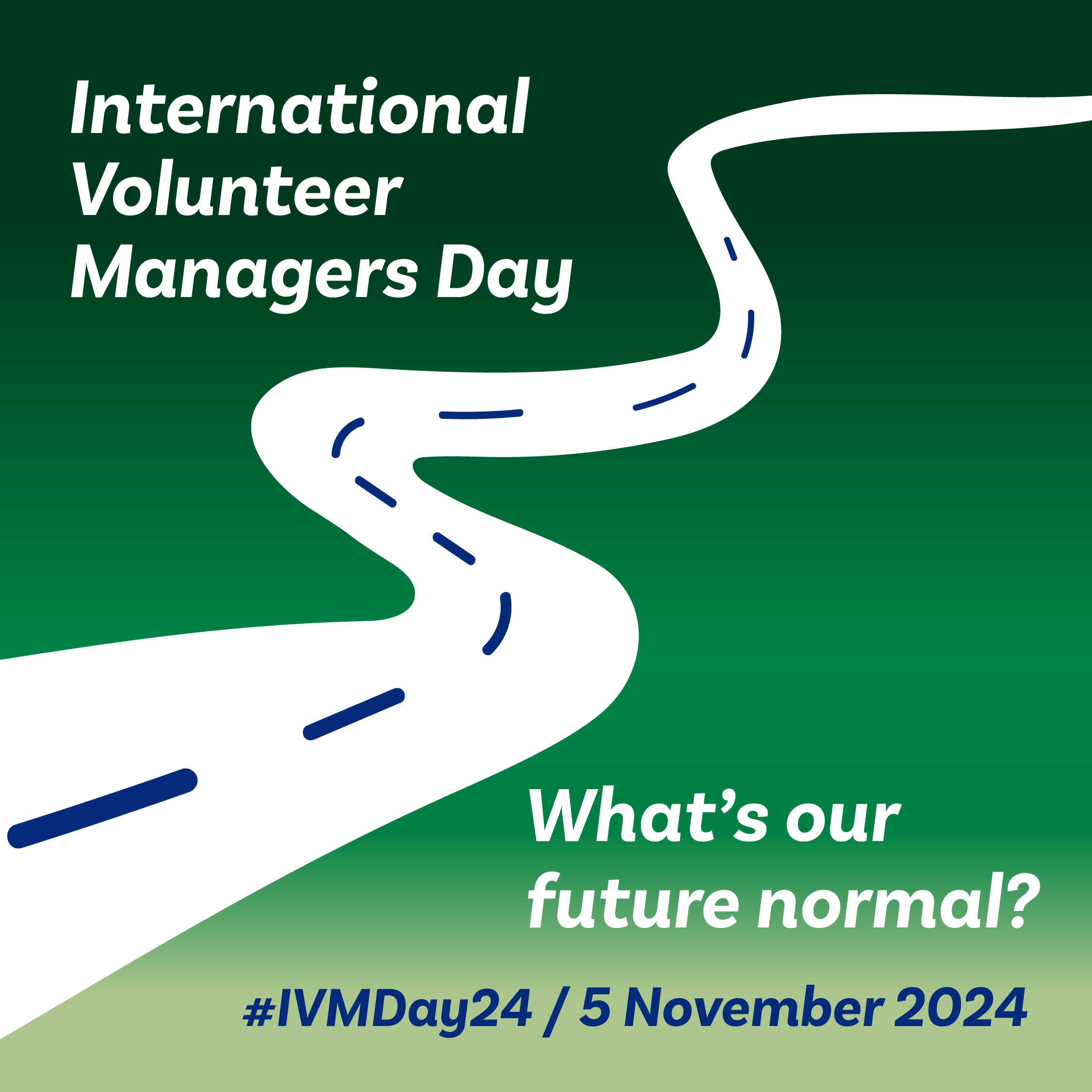
Advocacy
Campaigns
Leadership
The future normal for Volunteer Management
Imagine a future where it is normal for Volunteer Management to be well resourced and supported in our community organisations.
The theme of International Volunteer Manager Day this year was What’s our Future Normal? This article addresses what Volunteering New Zealand is doing to support a future normal.
Imagine the future normal
Imagine a future where it is normal for Volunteer Management to be well resourced and supported in our community organisations.
Where it is normal for volunteer managers to be paid well, have regular professional development, and recognition for their vital role.It should be normal for volunteer management teams to have the right resources to carry out their jobs effectively; and enough time to engage well with their volunteers.We know recent years have seen significant challenges for community organisations and volunteering.
The Covid-19 pandemic continues to cast a long shadow over the sector and organisations are struggling with access to funding and other resource gaps, while the demand for services continues to grow.However, at Volunteering New Zealand we see volunteer managers as changemakers.
You can see where you want to go, and can make it happen.
Volunteering NZ works to support you.
For almost 25 years, we have been tirelessly advocating for the rights of volunteers and for the visibility and resourcing of the volunteer sector. Best Practice GuidelinesWe now have Volunteer Best Practice Guidelines.
These were co-designed with the sector and published last year – along with online templates, resources and other ‘useful stuff’.As one sector leader told us,“The Volunteer Best Practice Guidelines give you permission to refer to best practice.
It helps the organisation to understand the volunteer service isn’t some kind of amateur hour; we too have professional guidelines.”Several volunteer centres have been running training workshops in the use of the guidelines and associated resources.
Volunteering New Zealand has upcoming Best Practice Guidelines online workshops – an introductory one, and workshops delving into each of the seven practice areas.Advocacy and dataWe continue to support and input into the work of the government’s Cross Agency Steering Group on volunteering.
This has included work to reduce the compliance burden on organisations, such as police vetting.
We are providing advice to volunteer organisations about volunteer screening.We advocate for better and more data about volunteering to support organisations.
Our State of Volunteering reports are good at surfacing information and insights to support leaders of volunteer engagement.
We also advocate for population-wide data, such as from Statistics New Zealand, to be captured and made available.
The latest data is from the General Social Survey, 2021, which asked a representative sample of the population about their activities in the previous month, including unpaid work.
It found that 50.7% of us do formal or informal volunteering.There is a time-lag, and even if Stats NZ is capturing some data, they aren’t analysing it for our needs, so we continue to ask for this.And we continue to advocate to funders on the needs of volunteer programmes to be properly resourced.Future workforce – volunteers and leadersOur latest State of Volunteering Report – with insights from over 1500 volunteers and 400 organisations – tells us more about volunteers and their changing needsIt identifies a trend for more casual volunteering – a quarter of people are giving up to 5 hours a month, while only 7% are volunteering over 20 hours.
Barriers for volunteers include the rising cost of living, lack of time and needing to work more, and concerns about health and safety.
The motivation for volunteering however remains the same – people are volunteering to enrich communities and for the social connections.We did a nationwide survey of Volunteer Managers in 2022: Thirty-seven percent of respondents received no training for managing volunteers over the previous year with a further 27 % receiving minimal training.We also know that volunteer managers are often new in their role, that they learn on the job, and are not professionally trained.
They need access to peers, and access to support/data in timely manner.Over the previous year we have run peer and mentoring programmes with 120 volunteer managers and leaders, providing much-needed coaching and support.The future – tech and toolsOur research showed that those organisations who had a volunteer management system fared much better during the Covid pandemic than those without.While we are a sector with an incredible amount of human and emotional capacity, it makes sense to invest in technology capacity.
Especially as many of the new tech and tools are available for free or low-cost to for-purpose organisations.At our Volunteering Hui in Christchurch in September, the role of AI in volunteer management was our most popular session.
Our AI expert urged us to be agile, willing to change and try new things, and upskill in AI literacy.
An organisational manager gave an example of trialling an AI Chatbot to help her with tasks like writing social media posts.
While there are risks and ethical concerns, developing good policies and protocols around their use will mitigate these.ConclusionVolunteer management can be an all-consuming job.
It is important to lift your head up from the day-to-day busyness and consider a bigger picture.
Take some time to invest in your own development to make your role more effective and more enjoyable.
Put some stepping stones in place towards a future normal, hopefully a more supported, resourced normality.
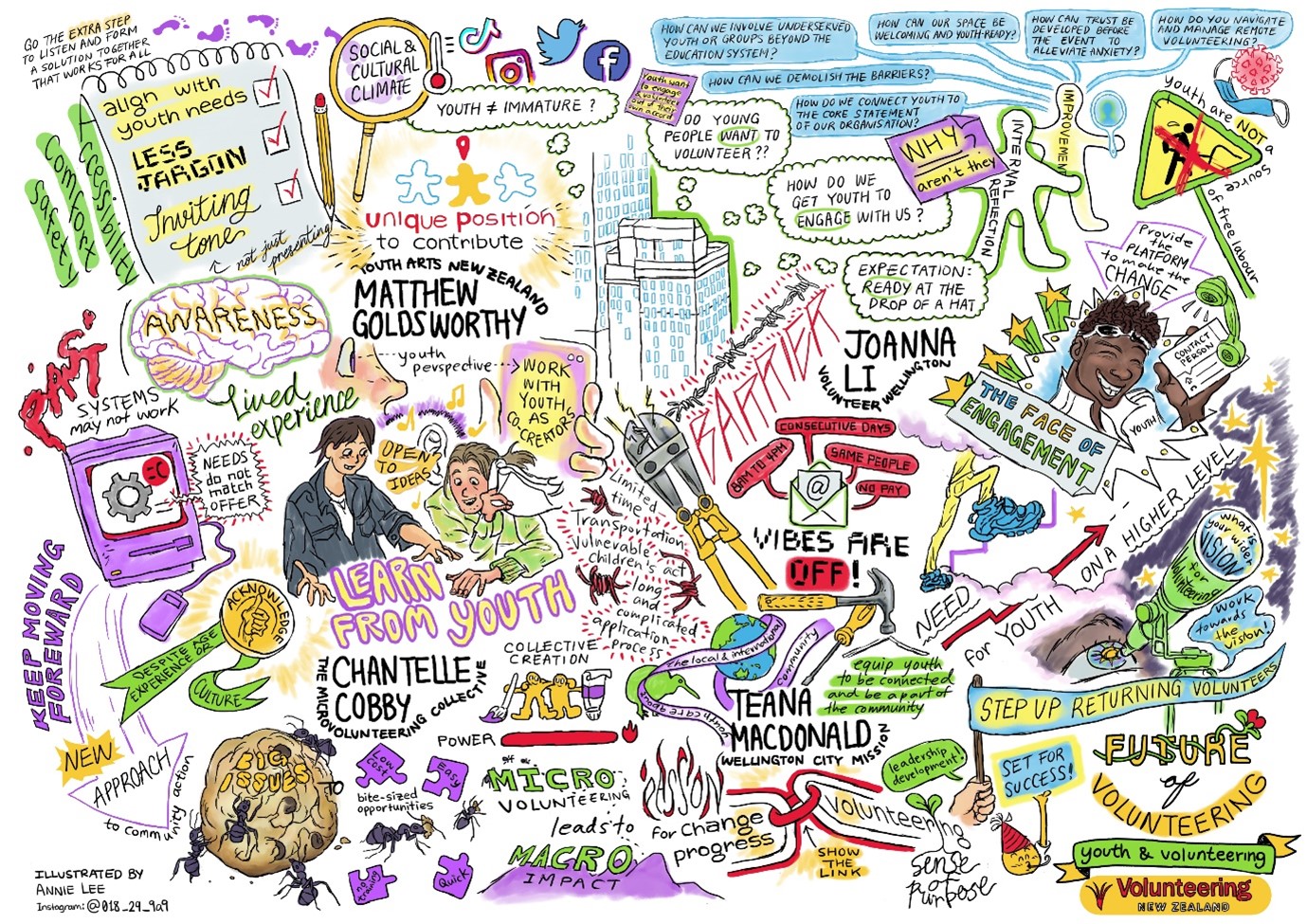
Inclusion
Youth
Enabling rangatahi and youth volunteering
A recent New Zealand study with 25 young volunteers (aged 18-30) has found It can be tough to work within established organisations.
A recent New Zealand study with 25 young volunteers (aged 18-30) has found It can be tough to work within established organisations.
This report The ability to change stuff up’: volunteering as a young person within established organisations involved in-depth interviews of the experiences of volunteers for a large variety of organisations in Canterbury, Aotearoa.Some volunteer-involving organisations reported challenges attracting and engaging young volunteers.
However, when they have been able to engage younger volunteers, volunteer-involving organisations report great work being done by those younger volunteers.
Volunteers are increasingly preferring episodic or project-based volunteering compared to more regular hours and long term commitments.
This trend is more prevalent for young volunteers.
Latest research on youth and volunteering
Young people volunteering: Removing the barriersThis report from Queensland Australia’s Family and Child Commission provides a comprehensive review of youth volunteering.
The report first identifies key benefits of volunteering for younger Australians and then outlines employment and economic value of volunteering in Queensland.
After explaining the impact of volunteering on individual and community well-being, the report provides an overview of key barriers and opportunities of volunteering.
There are two informative appendices that introduce legal and policy aspects of volunteering, and a snapshot of volunteering across Australia, respectively.Access full report.YOUTH VOLUNTEERING: SUPPORTING YOUNG PEOPLE’S ENGAGEMENT IN COVID-19 RESPONSE AND RECOVERY This report is prepared by The United Nations Development Programme (UNDP) which is the global development network of the United Nations.
The UNDP promotes technical and investment cooperation among nations and advocates for change and connects countries to knowledge, experience, and resources to help people build a better life for themselves.
The current report begins with an overview of the impacts of COVID-19 pandemic on young people.
Young women, young and youth, and youth in lower income countries are identified to have been systematically, deeply, and disproportionately influences by the pandemic.
Turning its attention to the role of volunteering in youth’s empowerment, the report highlights the benefits of volunteering, and identifies challenges and opportunities around youth and volunteering.
Next, the contributions of youth volunteers to the COVID-19 response and recovery are identified and recommendations are made to seize the potential benefits of youth volunteers.Access full reportDesigning virtual volunteering programs for young peoplePrepared by the “Volunteer Toronto” and “Pledges for Change”, this is a practical guide for non-profit groups and organisations looking to create, improve, and/or enhance their youth (under 18) virtual volunteering programmes.
The guide starts off by providing a background of the project before making a strong case for virtual volunteering, both in the immediate and long term.
The impact of the COVID-19 on Canada’s non-profit groups is explained and the need for engaging young people through virtual volunteering programmes elaborated.
After identifying challenges of virtual volunteering, the report develops a comprehensive strategy for virtual volunteering programmes and goes on to introduce a seven-step management cycle for a typical youth volunteer programme.
Finally, 6 tools are introduced to create a successful youth virtual volunteering programme. Access full reportLong-Term Consequences of Youth Volunteering: Voluntary Versus Involuntary ServiceThis academic research aims at addressing major gaps in knowledge about youth volunteering.
The research draws data from the National Longitudinal Study of Adolescent to Adult Health (in the United States) to examine the long-term effects of youth volunteering on the civic and personal aspects of volunteers’ lives.
The findings indicate youth volunteering has a positive impact on adult volunteering.
The research also confirms the psychological benefits of youth volunteering as well as improved educational attainment and earnings in young adulthood.
This paper also provides an interesting analysis and comparison of youth participation in voluntary versus involuntary programs.Access full reportResearch report: Youth volunteering in Auckland, 2019This research has been conducted in the Unitec Institute of Technology and sponsored by Volunteering Auckland.
Through interviewing volunteer managers and coordinators responsible for young volunteers’ engagement, the contribution of young volunteers to communities as well as the personal benefits to young people derived from their volunteering are identified and analysed.
The research provides an overview of volunteer activities, motivations, attraction and engagement, and challenges and barriers of volunteering for youth aged between 13 and 18.Access full report

Latest News
Research
Volunteer Managers receive more support
Media release 4 November
Celebrate International Volunteer Managers Day, 5 November
See Volunteer Managers and Leaders ReportVolunteer managers are getting more support for their role which is great news for International Volunteer Managers Day (5 November), says Volunteering New Zealand.“In the last year we have had a focus on supporting volunteer managers, who can be unsupported in their roles.
We have introduced new Volunteer Best Practice Guidelines, and had 80 people participate in our free peer support and mentoring programmes,” says Michelle Kitney, Chief Executive of Volunteering New Zealand.In a recent survey of volunteer managers and leaders, they report receiving more support in the past year particularly from online tools, Volunteering New Zealand’s website, and their professional networks.
The survey was previously done in 2022.The 2024 survey, completed by 92 volunteer managers, asked where they got support from (multiple options were allowed). 45% said Volunteering NZ website (25% in 2022), 30% said online tools (22% in 2022), while getting support from professional networks was 39% (29% in 2022).
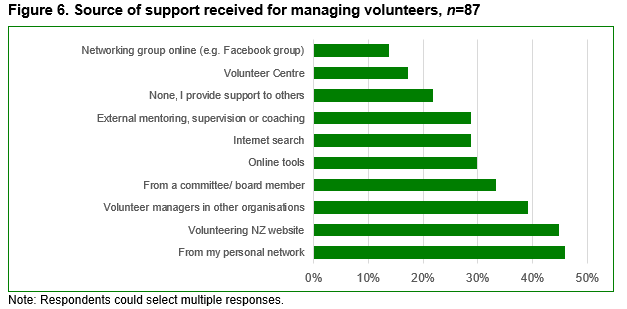
The amount of training they received in the previous year had increased, although 24% say they had no training at all (decreased from 37% in 2022).

“Managing volunteers is a very demanding role; some managers can be supporting hundreds of volunteers and dealing with everything from recruitment to onboarding, giving support and recognition.“We encourage volunteer managers to take advantage of the accessible, free training and resources provided by Volunteering New Zealand, regional volunteer centres and other organisations.
Well supported volunteer managers make a difference to the volunteer experience, and ultimately the efficacy of the volunteer organisation.”Volunteering New Zealand is planning regional training for the Best Practice Guidelines, and is updating its online learning management tools.ENDS
More information
See upcoming webinars for the Best Practice Guidelines.See more about International Volunteer Managers Day.

Community
News
Research
Leadership for Volunteering: IAVE 2021 report
Strong leadership helped the volunteer sector respond to the COVID-19 pandemic globally, and will help ensure something positive comes out of it, according to a new report by International Association for Volunteer Effort (IAVE).The report examines how COVID-19 has impacted the strategic leadership role of national Volunteer Leadership Organisations (VLOs) in advocacy, development and volunteer mobilisation during 2020-21.
Data was gathered from organisations in 67 countries across the world.Volunteer Leadership Organisations played a critical role in the sector’s response to the unprecedented challenges for volunteer-involving organisations caused by the COVID-19 pandemic.
Three-quarters of respondents developed a more strategic leadership approach.
Making use of existing networks or creating new ones helped to strengthen advocacy for the sector, and mobilise volunteers.For example, Volunteering New Zealand initiated a weekly online meeting with the 17 national volunteer centres to support their work; and it worked with the National Crisis Management Centre to develop guidelines to help with the response under new restrictions (COVID-19 alert levels).The evidence shows that across the globe the pandemic increased the complexity of the volunteering environment.
The findings indicate six themes for the VLO strategic response to the pandemic:
- Partnerships and coalitions: COVID-19 led to VLOs being involved in more partnerships, working to mobilize, support and advocate for volunteering.
- Advocacy: COVID-19 highlighted the role of VLOs in creating an enabling environment for volunteering.
- The development role of VLOs: COVID-19 opened up new opportunities and/or changed priorities for the capacity-building work of VLOs.
- Volunteer mobilisation: During COVID–19 VLOs continued and/or increased their support for volunteer mobilisation.
- The strategic role of VLOs: COVID-19 produced a step change in volunteering and VLOs had to adapt strategically to deliver an effective response.
- VLOs and the future of volunteering: Post COVID-19, VLOs must sustain and build their organisational resilience to be effective advocates for and supporters of volunteering as a catalyst for change in the world.
Ongoing change and unpredictability are likely to be the hallmarks of the future of volunteering.
However, relationships formed at the local, regional and multinational levels will continue to be important.
Volunteer Leading Organisations will be influential in their strategic leadership role.
